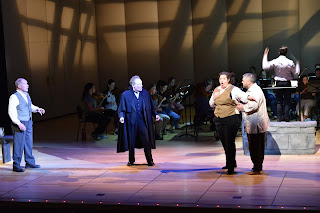ICO's 'Fidelio' makes strong statement, musically and dramatically
 |
| Fidelio (Leonore) protects Florestan from Pizarro's revenge. |
With costuming reduced to simple suggestions of character in context and props that can be used or ignored, except as conveniences for group positioning (as temporarily released prisoners do around the furniture), the simple outlines of the story remain intact. The disguise of a political prisoner's wife with a rescue plan as a newly hired male servant to the warden — too absurd? Not when the dramatic illusion doesn't have to be very plausible.
Even better, and in such a small hall as the Schrott Center at Butler University, the spoken dialogue (in the vernacular as is usual) is intelligible without supertitles, reserved for the sung elements and quite legible. Everything comes together as a unit, in a way Americans have become used to in the musical-comedy genre.
Best of all, having the orchestra onstage behind the singers can minimize balance issues. And onstage monitors allow the singers to check their coordination with conducted accompaniments that are normally in front of them. On Saturday, the cast was free enough dramatically so that whatever checking they needed to do with the televised image seemed minimal.
Conducted by Matthew Kraemer, the performance was sensitively detailed and capable of retaining momentum that bridged the spoken dialogue in order to project the music. The overture promised great things, with its characteristic contrasts foreshadowing the show's swings from hope through despair to triumph.
Moments of suspense set up good showcases for the singers. The introduction to the prisoners' chorus floated on the promise of relief from confinement. The emerging incarcerated men express gratitude for a brief respite from Pizarro's cruelty, thanks to the humane jailer Rocco, and the benefits of sunlight and fresh air. The men, to be joined by women only in the final chorus of triumph, had been well prepared by Eric Schmidt.
Similarly, the introduction to Florestan's aria from his dungeon confines was suspenseful, allowing for his outburst of almost preternatural energy as performed by James Flora to make its maximum effect. And the showcase for Leonore, the other half of the heroic couple, beginning with the enraged recitative, "Abscheulicher! wo eilst du hin?", benefited from Beethoven's heroic writing for the French horns in the subsequent aria. Marcy Stonikas was enough of a vocal powerhouse not to be overmatched by the accompaniment, which presented the ICO players in excellent form.
Throughout, the soprano was fully believable as the title character despite the awkwardness of a deception that audiences must provisionally accept. Stonikas' main dramatic responsibility in the role is to project Leonore's commitment to her bold plan and her faith in a marriage bond put to rather extreme tests of devotion. Jon Truitt, who played Pizarro with a bad-guy thoroughness that helped us understand what the heroine is up against, was also this production's stage director.
Nearly every gesture and expression he elicited from himself and his cast seemed to fit. I only wondered at Fidelio's relative idleness when master and servant follow Pizarro's orders to dig a grave for the doomed Florestan. Stonikas did little besides hold a lantern, even though the sung dialogue indicates Fidelio and Rocco, a father-figure of genuine humanity in Kevin Langan's portrayal, should both be wielding shovels. Leaving the heavy labor to his presumed father-in-law-to-be — Rocco has blessed the proposed union between Fidelio and his love-smitten daughter Marzelline — would seem to send a risky message.
Beethoven was somewhat prissy in departing from the virtuous side of marital love. His sense of humor rarely permitted unseemly levity. He once said he couldn't imagine composing operas of the "Marriage of Figaro" and "Don Giovanni" sort. I've read somewhere that a third Mozart opera, "Cosi fan tutte," shocked him with its blithe cynicism about women's faithfulness.
But Beethoven is stoutly lighthearted about the interplay of Marzelline and Jaquino, a jailer in love with his boss's daughter and hoping to marry her. Scott Wichael and Rachel Policar carried off the romantic jousting between the two characters with credit. This indulgence in a comic complication is essential to show a further challenge to Leonore/Fidelio — how to fend off an inappropriate marriage while maintaining a disguise with a larger purpose behind it.
The famous arrival of a minister representing the king is heralded by a trumpet fanfare of an even greater Judgment Day finality in another overture Beethoven wrote for this opera. The "Leonore Oveture No. 3" was mocked with abandon in a parody by the 1961 Hoffnung Festival in which trumpet fanfares spill raucously throughout the hall and a street band marches in. You can't unhear something like that, and it was recorded.
Getting back to the real "Fidelio" — and not a moment too soon — this production's minister in the nick of time was sung by Jeremy Gussin with an appropriate basso uprightness about the restoration of justice. Immediately following, every character standing for virtue joins in a choral finale celebrating the strength of the marital bond, one that the composer never enjoyed. It wrapped matters up with gusto as the ICO was finally able to observe Beethoven's 250th birthday with a project the pandemic delayed by three years. It was well worth the wait. The absurdity fades, and the power of one of music's supreme masters prevails.



Comments
Post a Comment